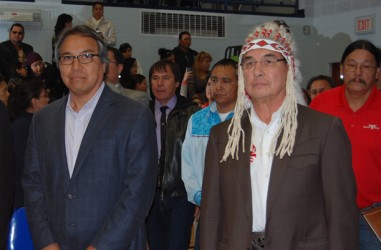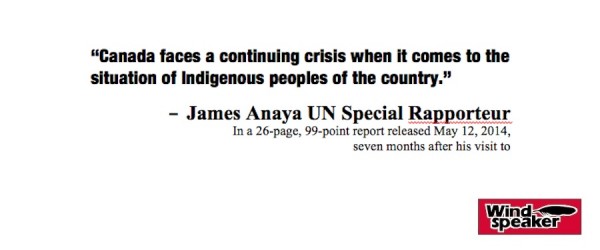Article Origin
Volume
Issue
Year
The United Nations Special Rapporteur has told the Canadian government that it is not doing enough to improve the economic, living, and social conditions of its Indigenous peoples despite having mechanisms in place to do so.
“Canada’s relationship with the Indigenous peoples within its borders is governed by a well-developed legal framework (and) a number of policy initiatives that in many respects are protective of Indigenous peoples’ rights. But despite positive steps, daunting challenges remain,” wrote UN Special Rapporteur James Anaya in a 26-page, 99-point report released May 12, seven months after his visit to Canada.
“Canada faces a continuing crisis when it comes to the situation of Indigenous peoples of the country.”
Anaya pointed out that the Indian Act continues to cripple self-government; that funding for and delivery of education, health programs, social programs and housing on-reserve was inadequate; that the federal government was adversarial in the way it addressed treaty and Aboriginal claims; that meaningful consultation was necessary when it came to development on First Nations land, as well as the development of new policies and programs for Indigenous peoples; and that a national inquiry into the numbers of missing and murdered Aboriginal women and girls was required.
International Chief Wilton Littlechild, who was at a UN meeting in New York when Anaya’s report was released, is impressed not only with the way Anaya captured the concerns of the Indigenous people in his short eight-day visit, but the way in which Anaya was able to put the struggles into context.
“He was very historically well-grounded in terms of the political and legal situation in Canada and … I think he caught the very challenging issues for all three of us, meaning the First Nations, Metis and the Inuit,” said Littlechild, who accompanied Anaya on his October visit. “It’s interesting that … he did his mission and then he made his recommendations and now look at what’s happening.”
Littlechild points to Anaya’s call for shelving a First Nations Education Act until full consultation was conducted. Although morphing into a different act since Anaya’s visit, Aboriginal Affairs and Northern Development Canada Minister Bernard Valcourt has put the First Nations Control of First Nations Education bill on hold following the resignation of National Chief Shawn Atleo as head of the Assembly of First Nations.
As well, Anaya echoed the calls of Indigenous groups for a national inquiry into the numbers of murdered and missing Aboriginal women and girls. And now the RCMP has come up with figures that more than double the claims made by the Native Women’s Association of Canada.
Anaya also recommended that the mandate of the Truth and Reconciliation Commission for Indian residential schools be extended “for as long as it may be necessary for it to complete its work.” Shortly after Anaya’s visit, the federal government announced a year’s extension to the TRC.
Federation of Saskatchewan Indian Nations Chief Perry Bellegarde said Anaya makes it clear that the relationship between Canada and its Indigenous people is strained.
But both Bellegarde and Littlechild admit that none of what Anaya had to say, which led to 16 recommendations, is news to the federal or provincial and territorial governments.
“While we have been saying this as Indigenous people many times over and over again, they have not been listening. So from an independent expert of the United Nations’ perspective that should alone cause Canada and the provincial governments to take his recommendations very seriously and especially towards implementation of his recommendations,” said Littlechild.
He also believes that Indigenous people have a continued role to play in working collaboratively with the governments to ensure that the challenges are met and that recommendations are implemented.
Bellegarde said the UN report is damning to the Canadian government. He points out that Canada ranks sixth on the UN quality of life index, but First Nations people within the country rank 63 and fall into the Third World category.
“The eyes of the world are watching. This is one of Canada’s biggest, darkest secrets and they don’t like being exposed, but that’s the only way you’re going to deal with the issues, when it’s exposed to not only the national public, but the international community as well. These issues need to be addressed and they need to be addressed now,” said Bellegarde.
Littlechild said he is “always optimistic that things will change. I work in the international arena and I have seen change, sometimes very slowly and I have seen no change, but where there’s no change, there sometimes consequences.”
Other Indigenous organizations, such as the Assembly of First Nations, Congress of Aboriginal Peoples and the Truth and Reconciliation Commission, commended Anaya’s report and his strong recommendations.
- 5000 views


